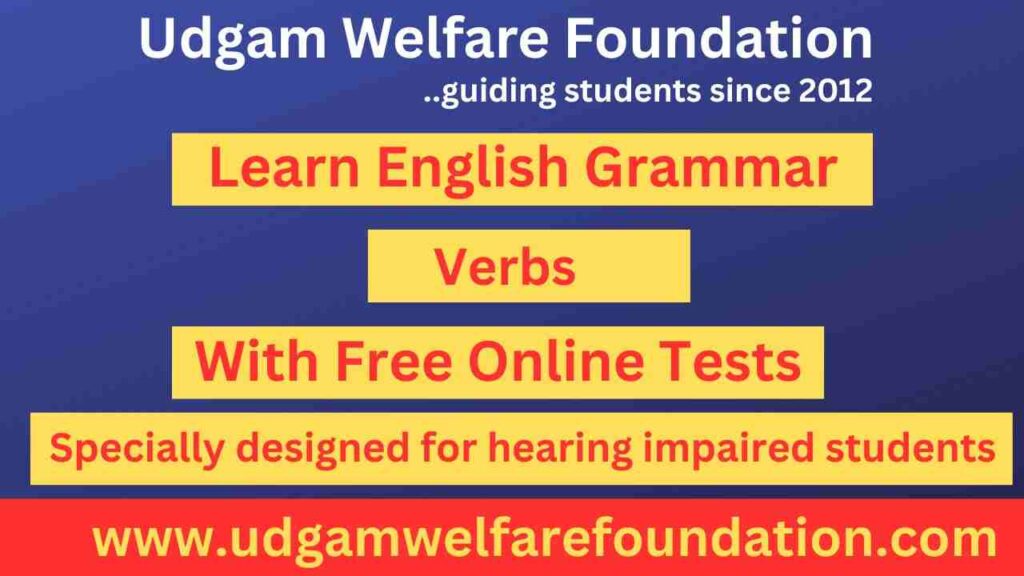Verbs: The Action Words!
What is a Verb?
A verb is a word that shows an action (like run, jump, eat), an occurrence (like happen, become), or a state of being (like is, am, are). Verbs are the heart of every sentence. Without a verb, a sentence cannot exist!
क्रिया (Verb) वह शब्द है जो किसी कार्य, घटना, या स्थिति को दर्शाता है। जैसे—दौड़ना, कूदना, होना, आदि।
Why are Verbs Important?
Verbs tell us what the subject of a sentence is doing or what is happening to it. For example:
- Rahul plays football.
- The sun shines brightly.
- She is happy.
In these sentences, “plays,” “shines,” and “is” are verbs.
Example: The bird flies in the sky.
उदाहरण: पक्षी आकाश में उड़ता है।
Detailed Definition of Verbs
Verbs are words that express action, occurrence, or state of being. They are essential because they tell us what is happening in a sentence. Verbs can be classified into several types, such as action verbs (run, write, sing), linking verbs (is, am, are, seem), and helping verbs (can, will, must). Action verbs show physical or mental actions, while linking verbs connect the subject to additional information. Helping verbs assist the main verb to express tense, mood, or voice.
For example, in the sentence “She can sing beautifully,” “can” is a helping verb and “sing” is the main action verb. Verbs also change form to show tense (past, present, future) and agree with their subjects in number (singular or plural).
क्रिया शब्द कार्य, घटना, या स्थिति को व्यक्त करते हैं। ये वाक्य के मुख्य भाग होते हैं और हमें बताते हैं कि क्या हो रहा है। क्रिया तीन प्रकार की होती है: कार्यसूचक (दौड़ना, लिखना), सहायक (सकना, होना), और संयोजक (है, हैं)।
| Type of Verb | Definition | Examples | Example Sentence |
|---|---|---|---|
| Action Verbs | Verbs that express physical or mental actions. | run, jump, eat, think, write, sing, dance | She runs every morning. |
| Linking Verbs | Verbs that connect the subject to additional information. | is, am, are, was, were, seem, become, feel | He is happy. |
| Helping Verbs | Verbs that help the main verb express tense, mood, or voice. | can, will, must, shall, may, could, would | They can swim. |
| Regular Verbs | Verbs that follow the standard -ed ending for past tense. | walk/walked, play/played, cook/cooked | She walked to school. |
| Irregular Verbs | Verbs that change form for past tense. | go/went, eat/ate, see/saw, take/took | He ate an apple. |
| Modal Verbs | Verbs that express ability, possibility, permission, or obligation. | can, could, may, might, must, shall, should, will, would | You should study. |
Types of Verbs
1. Action Verbs
Action verbs express physical or mental actions. They answer the question “What is the subject doing?”
Examples: dance, think, build, laugh, write
Sentence: He writes a letter.
उदाहरण: वह एक पत्र लिखता है।
2. Linking Verbs
Linking verbs connect the subject to a word that describes or renames it. Common linking verbs include “be” verbs (is, am, are, was, were) and others like seem, become, feel.
Examples: is, am, are, was, were, seem, become
Sentence: She is a doctor.
उदाहरण: वह डॉक्टर है।
3. Helping Verbs
Helping verbs (also called auxiliary verbs) help the main verb express tense, mood, or voice. They are used with action or linking verbs.
Examples: can, will, must, shall, may, could, would
Sentence: They will go to school.
उदाहरण: वे स्कूल जाएंगे।
Common Rules and Tips for Using Verbs
- Subject-Verb Agreement: Singular subjects take singular verbs, and plural subjects take plural verbs.
- Tense Consistency: Keep the same tense throughout a sentence or paragraph unless there is a reason to change.
- Regular and Irregular Verbs: Regular verbs add -ed for past tense (walk/walked), but irregular verbs change form (go/went).
- Use Strong Verbs: Strong verbs make your writing more interesting. Instead of “walk,” use “march” or “stroll.”
- Avoid Double Negatives: Never use two negative words in the same sentence (e.g., “I don’t have no time” is incorrect).
Fill in the Blanks
Complete the sentences with the correct verb:
- She ______ (go/goes) to school every day.
- They ______ (is/are) playing in the park.
- He ______ (write/writes) stories.
- We ______ (has/have) a new teacher.
- The baby ______ (cry/cries) at night.
- You ______ (was/were) late yesterday.
- I ______ (can/could) swim when I was five.
- goes
- are
- writes
- have
- cries
- was
- could
General Error Correction Rules
Common Mistake: Using the wrong verb form with the subject.
Incorrect: She don’t like apples.
Correct: She doesn’t like apples.
गलती: विषय के साथ गलत क्रिया रूप का प्रयोग।
गलत: वह सेब पसंद नहीं करता।
सही: वह सेब पसंद नहीं करती।
Common Mistake: Mixing up past and present tense.
Incorrect: Yesterday, I go to the market.
Correct: Yesterday, I went to the market.
गलती: भूतकाल और वर्तमान काल का गलत प्रयोग।
गलत: कल, मैं बाजार गया।
सही: कल, मैं बाजार गया था।
Find the Error
Correct the errors in these sentences:
- He don’t know the answer.
- They was happy to see me.
- She write a letter yesterday.
- We is going to the park.
- You has a new book.
- He doesn’t know the answer.
- They were happy to see me.
- She wrote a letter yesterday.
- We are going to the park.
- You have a new book.
Passage-Based Practice
Passage 1: Every morning, Priya wakes up early. She brushes her teeth and eats breakfast. Then, she goes to school. Priya loves her school because she has many friends there. Her teacher says she is a good student.
Questions:
- What does Priya do every morning?
- Why does Priya love her school?
- Find two action verbs in the passage.
- Priya wakes up, brushes her teeth, eats breakfast, and goes to school.
- She loves her school because she has many friends there.
- wakes, brushes, eats, goes, loves, has, says
Passage 2: Last Sunday, my family went to the zoo. We saw many animals. The lions were roaring loudly. My brother took lots of pictures. It was a fun day.
Questions:
- Where did the family go last Sunday?
- What did the lions do?
- Find one linking verb in the passage.
- They went to the zoo.
- The lions were roaring loudly.
- was
Summary
Verbs are the action words that make sentences complete. They can be action verbs, linking verbs, or helping verbs. Remember to match the verb with the subject and use the correct tense. Practice using verbs in your speaking and writing to become more confident!
क्रिया वाक्य को पूर्ण बनाती हैं। इनका सही प्रयोग करें और अपने बोलने और लिखने में क्रियाओं का अभ्यास करें।
Verbs Practice Questions of What is Verb ?
1. Which word is an action verb?
a) is
b) run
c) am
d) are
2. Identify the linking verb:
a) jump
b) sing
c) seem
d) eat
3. Which is a helping verb?
a) happy
b) can
c) table
d) quickly
4. In the sentence “She is happy,” what type of verb is “is”?
a) Action verb
b) Linking verb
c) Helping verb
d) None
5. Which word is NOT a verb?
a) write
b) book
c) read
d) run
6. What type of verb is “became”?
a) Action verb
b) Linking verb
c) Helping verb
d) None
7. Which is an action verb?
a) will
b) was
c) dance
d) are
8. In “They can swim,” what is “can”?
a) Action verb
b) Linking verb
c) Helping verb
d) None
9. Which word is a linking verb?
a) laugh
b) feel
c) must
d) should
10. What type of verb is “must”?
a) Action verb
b) Linking verb
c) Helping verb
d) None
11. Which is NOT a helping verb?
a) will
b) shall
c) write
d) may
12. In “The cake smells good,” what type of verb is “smells”?
a) Action verb
b) Linking verb
c) Helping verb
d) None
13. Which word is an action verb?
a) is
b) am
c) paint
d) are
14. What type of verb is “were”?
a) Action verb
b) Linking verb
c) Helping verb
d) Both b and c
15. In “She will go,” what type of verb is “will”?
a) Action verb
b) Linking verb
c) Helping verb
d) None

